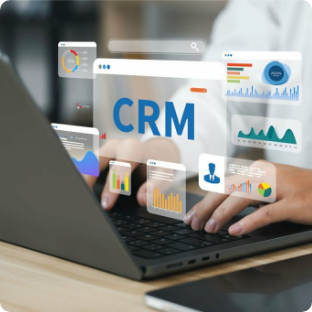
Maximizing Efficiency and Insight: The Power of CRM and ERP Integration

Maximizing Efficiency and Insight: The Power of CRM and ERP Integration
Here is a scenario for you: Business owner X has been running his business for ten years. He experienced massive growth in the initial years, thanks to the latest tools and technology. This success was short-lived, the growth graph decreased tremendously, and he eventually reached a dead end. He didn’t want to exit, nor did he want to bear the loss.
What do you think was the reason for this decline?
In today’s fast-paced, hyper-competitive environment, having powerful tools at your disposal isn’t enough. You need to stand out from the crowd and for that, you need to be ahead of the crowd. But how? For continuous growth, you do need tools but they need to be integrated well.
This is where Customer Relationship Management (CRM) and Enterprise Resource Planning (ERP) systems play their part.
Now is the time for a comprehensive example that will help you understand the importance of this magical duo once integrated.
Imagine you run a company that sells athletic apparel online.
- CRM in isolation: Your sales team uses a CRM system to manage customer interactions. They can track leads, send email campaigns, and monitor sales pipelines. However, they lack real-time information on inventory levels or order fulfillment status. This can lead to inaccurate quotes, frustrated customers due to stockouts, and delayed order processing.
- ERP in isolation: Your ERP system manages inventory, orders, and finances. It keeps track of stock levels, generates invoices, and facilitates order fulfillment. However, the ERP system has limited visibility into customer interactions and sales opportunities. This can lead to missed sales opportunities due to poor inventory forecasting and a lack of targeted marketing campaigns.
Now, let's see how CRM and ERP integration can unlock growth:
Improved Sales Conversions: A salesperson receives a lead for a bulk order of running shoes. Through the integrated CRM-ERP system, they can instantly access real-time inventory data within the CRM interface. This allows them to confirm availability, provide an accurate quote, and close the deal with confidence.
Streamlined Order Fulfillment: Once the order is confirmed in the CRM system, the data automatically flows to the ERP system. This triggers:
- Inventory update: Stock levels are automatically adjusted to reflect the sale.
- Order processing: The order is automatically routed to the fulfillment center for efficient picking and packing.
- Invoice generation: An invoice is automatically generated and sent to the customer.
Data-Driven Marketing: Insights from the integrated system reveal a surge in demand for a specific type of running shoe. The marketing team leverages this data to launch targeted email campaigns and social media promotions, capitalizing on the trend and driving further sales.
Enhanced Customer Service: A customer inquires about the status of their order. The customer service representative can access the customer’s order history and real-time fulfillment data directly within the CRM system. This allows them to provide accurate updates and resolve any issues efficiently, fostering customer satisfaction and loyalty.
The integration between CRM and ERP eliminates data silos, improves data accuracy, and streamlines communication across departments. This has several benefits that ultimately lead to growth:
- Increased Sales: Accurate quotes, faster order fulfillment, and targeted marketing campaigns lead to increased sales conversions.
- Improved Customer Satisfaction: Efficient service, accurate information, and personalized communication enhance customer satisfaction and loyalty.
- Reduced Operational Costs: Automation eliminates manual data entry errors, reduces time spent on repetitive tasks, and improves overall operational efficiency.
- Data-Driven Decision Making: Consolidated data provides valuable insights that empower informed business decisions for improved inventory management, product development, and marketing strategies.
By Integrating CRM and ERP systems businesses can create a unified platform that fosters collaboration, optimizes processes, and fuels growth.
Key Considerations for Successful Integration:
By now, you have a clear understanding of the power of Integrating CRM and ERP. Once done well, it creates a seamless connection that fosters growth and collaboration. But before you dig into integrating these systems, don’t forget to consider the following factors for a successful integration.
1. Data Mapping:
- This is the foundation for a successful integration. Define clear rules for how data will be transferred between CRM and ERP systems.
- Identify key data fields in both systems, such as customer names, contact information, product details, order data, and pricing.
- Establish a mapping strategy that ensures consistent data format and terminology across both systems. This avoids confusion and maintains data integrity.
2. Customization:
- A one-size-fits-all approach doesn’t work for integration. Tailor the integration to your specific business needs and workflows.
- Consider factors such as:
- Workflow automation: Identify repetitive tasks that can be automated to streamline processes across departments.
- Custom fields: If your CRM or ERP system has custom fields not found in the other, determine how this data will be handled during integration.
- User permissions: Establish user access controls to ensure different departments have access to the data they need while maintaining data security.
3. Scalability:
- Choose an integration solution that can scale alongside your business growth.
- Consider your future expansion plans and ensure the chosen technology can adapt to accommodate increasing data volumes and user needs.
- Explore cloud-based integration solutions that offer flexible scalability options.
4. Security:
- Protecting sensitive customer and business information is paramount.
- Implement robust security measures such as:
- Encryption: Encrypt data transmissions to safeguard information during transfer between systems.
- Access controls: Enforce user access permissions to ensure only authorized personnel have access to sensitive data.
- Regular security audits: Conduct regular audits to identify and address any potential security vulnerabilities.
5. Change Management:
- Integrating systems can impact existing workflows. Prepare your team for the change.
- Develop a comprehensive change management strategy that includes user training, clear communication about the benefits of integration, and ongoing support to address any challenges that may arise during the transition.
Additional Considerations:
- Integration Tools: Evaluate various integration tools available, considering factors like cost, ease of use, scalability, and compatibility with your existing systems.
- Data Quality: Ensure data quality in both CRM and ERP systems before integration. Cleanse and standardize data to minimize errors and ensure smooth data flow.
- Testing: Thoroughly test the integration before deployment to identify and resolve any potential issues.
Once you consider these key factors, the chances of a successful CRM and ERP integration increase many folds, propelling your business towards growth and success.
How Vertekx Can Help You Leverage the Power of CRM and ERP Integration:
Implementing these changes in your business may seem overwhelming especially when you have to look at the bigger picture, establish strategies, and run an enormous organization. This is where we dive in. At Vertekx, we understand the complexities these systems bring and that’s where our expertise comes in. We can help achieve seamless and successful integration that unlocks the full potential of both these systems. Here’s how we can help:
1. In-depth Analysis & Planning:
- We begin by conducting a thorough analysis of your existing CRM and ERP systems, along with your unique business needs and goals.
- Based on this analysis, we develop a customized integration plan that aligns with your specific workflows and data requirements.
2. Expertise in Data Mapping & Customization:
- Our team of certified developers possesses in-depth knowledge of leading CRM and ERP platforms.
- We map data fields across systems, ensuring consistent data format and terminology for information flow.
- We configure the integration to accommodate your specific needs, whether it’s automating workflows, handling custom fields, or establishing user access controls.
3. Selecting the Right Integration Tools:
- We understand that the integration landscape can be overwhelming.
- Our experts will evaluate your existing infrastructure and recommend the most suitable integration tools for your specific needs, considering factors like cost, scalability, and compatibility.
4. Secure & Scalable Integration Solutions:
- Security is our top priority. We implement robust security measures to ensure the confidentiality and integrity of your sensitive data during and after integration.
- We choose integration solutions that offer scalability, allowing your system to adapt and grow as your business expands.
5. Seamless Implementation & Ongoing Support:
- Our experienced team will handle the entire integration process from configuration and testing to deployment.
- We provide comprehensive ongoing support to ensure your integrated system functions optimally and address any challenges that may arise after implementation.
The Vertekx Advantage:
- Proven Track Record: With over a decade of experience and helping 100+ businesses achieve substantial growth, we have a proven track record of successful CRM and ERP integrations for businesses of all sizes, across various industries.
- Technology Agnostic: We are not tied to specific vendors. Our expertise allows us to integrate diverse CRM and ERP platforms for an optimal solution.
Ready to Unleash the Power of Unified CRM and ERP?
Let Vertekx be your guide. Contact us today for a free consultation to discuss your specific needs and explore how our expertise can help you unlock the transformative potential of CRM and ERP integration.
See Our Blogs
10 Reasons Why CRM Shouldn’t Be Overlooked
In today’s competitive business landscape...
Rediscover the Power of Customer Relationship Management …
As a business owner, finding the...
Choosing the Perfect CRM: A Practical Guide for Comparison
The world of Customer Relationship...
Trusted & Supported By Many
Over the years, Vertekx has demonstrated unwavering dedication and maintained a consistent
commitment, driving business transformation through robust and flexible digital solutions,
addressing today’s requirements while unlocking tomorrow’s possibilities.



